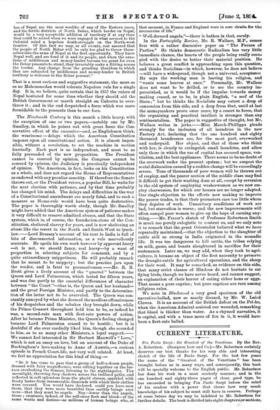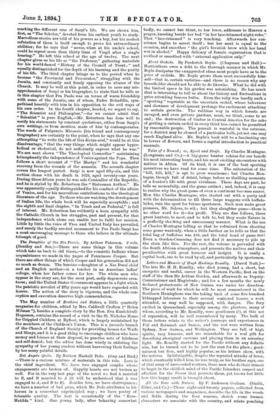CURRENT LITERATURE.
Fra Paolo Sarpi : the Greatest of the Venetians. By the Rev. A. Robertson. (Sampson Low and Co.)—Mr. Robertson certainly deserves our best thanks for his very able and interesting sketch of the life of Paolo Serpi. For the last few years the name of the "Greatest of the Venetians" has been brought before us in many ways, and consequently, this book will be specially welcome to the English public. Mr. Robertson has done his work in a most masterly manner; and in the one hundred and eighty-three pages of clear, good type, he has succeeded in bringing Fra Paolo Sarpi before the mind of his readers with a power that shows how very much knowledge of his subject he must still have in reserve. Perhaps at some future day we may be indebted to Mr. Robertson for further details. The book is divided into eight chapter-Nor sections, marking the different eras of Sarpi's life. We are shown him, first, as "The Scholar," devoted from his earliest youth to study. Marvellous stories are told of his powers as a boy, but his modest refutation of them is itself enough to prove his extraordinary abilities; for he says that "never, when at his uncle's school, could he repeat more than thirty lines of Virgil after a single hearing." He left this school at the age of twelve. The next chapter gives us his life as "the Professor," gathering materials for his world-famed "History of the Council of Trent ; " and equally distinguished for the depth of his learning and the purity of his life_ The third chapter brings us to the period when he became "the Provincial and Procurator," struggling with the Jesuits, and constantly and firmly opposing the abuses of the Church. It may be well at this point, in order to save any mis- apprehension of Serpi or his biographer, to state that he tells us in this chapter that Fra Paolo was on terms of warm friendship with some of the Jesuits, one of whom, Padre Bobadilla, sym- pathised heartily with him in his opposition to the evil ways of his own order. In the fourth chapter, headed, we regret to say, "The Scientist and Philosopher,"—for we cannot admit that " Scientist" is pure English,—Mr. Robertson has done well to verify his statements by constant quotations, either from Sarpi's own writings, or from mention made of him by contemporaries. The words of Fulgenzio Micanzio (his friend and contemporary biographer) are certainly to the point, when he says that any one attempting "to write the life of this divine soul," would be at this disadvantage, "that the very things which might appear hyper- bolical or rhetorical, do not sufficiently express what be was." We are next shown "The Theological Counsellor" maintaining triumphantly the independence of Venice against the Pope. Then follows a short account of "The Martyr" and his wonderful recovery from the wounds of the assassin. The seventh chapter covers the longest period. Serpi is now aged fifty-six, and this section closes with his death in 1623, aged seventy-one years. During these fifteen years he was sole Counsellor of the Republic, and he is styled by Mr. Robertson the "Statesman Author." He was apparently equally distinguished for his conduct of the affairs of Venice, and for his marvellous contributions to the theological literature of the age. To those who are watching the development of Italian life, the whole book will be especially acceptable ; and the eighth and final chapter, "In Tomb and on Pedestal," is full of interest. Mr. Robertson has evidently a keen sympathy with the Catholic Church in her struggles, past and present, for that independence which alone can enable her to fulfil her mission. Little by little the voice of Free and United Italy has prevailed, and surely the tardily erected monument to Fra Paolo Serpi has a most encouraging message to those who believe in the ultimate triumph of good.







































 Previous page
Previous page